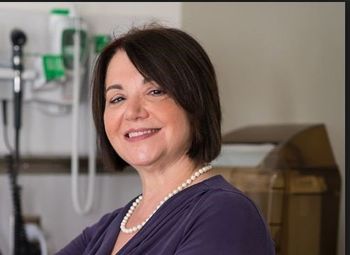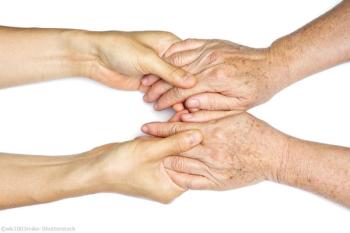
- ONCOLOGY Nurse Edition Vol 25 No 2
- Volume 25
- Issue 2
Care of the Older Adult With Cancer
One area in which to start is to ensure that colleagues are aware of the 2007 Oncology Nursing Society (ONS) Position Paper on cancer in the elderly.[8] This position paper lays out the landscape of caring for older adults with cancer both in terms of problems to date and future initiatives to address.
As a practicing oncology nurse, it is very important for you to know that:
• Older adults are now the "core business" of health care.[1]
• The total economic burden of cancer is more than $209 billion, with older patients accounting for a disproportionate amount of this expenditure.[2]
• The risk of developing cancer rises exponentially with age such that adults 40–59 years of age have an 8%–9% risk, while adults over age 60 have a 20%–30% risk of being diagnosed with a malignancy.[3]
• The mean age for the diagnosis of colon, lung, prostate, bladder, and pancreatic cancers is currently 71 years.[4]
• Sixty percent of cancer incidence and 70% of cancer mortality occur in adults greater than 65 years of age.[5]
• By 2030, approximately 70% of all malignancies and 80% of all deaths due to cancer will occur in those aged 65 and older.[6]
• Approximately 60% of all cancer survivors are older and are characterized by wide-ranging concerns and unmet needs.[7,8]
• The paradoxical invisibility of ageism in cancer and age-disparate care underscores the potential dangers of sustaining these attitudes and practices.[9]
• For the predominantly younger interdisciplinary cancer care team, efforts to foster empathy with older patients, whose life situation may be one of profound existential challenge, are needed.[10]
• An enhanced future of cancer care requires recognition that older people with cancer have historically been underserved.[3]
Suggested Publications for a Geriatric Oncology Nursing Journal Club
The news is generally not good for the majority of Americans diagnosed with a malignancy. Older adults adapting to, coping with, and enduring cancer have been systematically ignored over time. Despite their predominance in contemporary cancer care, the elderly with cancer remain an enigma.
The good news is that oncology nurses can confront this existing paradigm with four major initiatives: pervasive information sharing, engaging in advocacy efforts, considering opportunities for the translation of best practices, and undertaking quality improvement and research endeavors. These can ultimately drive significant change to counter our current reality.
PERVASIVE INFORMATION SHARING
One area in which to start is to ensure that colleagues are aware of the 2007 Oncology Nursing Society (ONS) Position Paper on cancer in the elderly.[8] This position paper lays out the landscape of caring for older adults with cancer both in terms of problems to date and future initiatives to address. Dissemination of information about geriatric oncology nursing can evolve from various types of platforms. Nursing Grand Rounds and ONS local chapter meetings can target older adults' needs. Inviting a nurse specializing in gerontology to speak can help increase awareness. Many communities have an Area Agency on Aging whose services may remain untapped by the older adult oncologic community. Inquiring about available resources for older adults may unveil opportunities for the generation of community-based supportive care. Journal clubs are an effective vehicle through which to prompt dialogue and consider new approaches (see box, "Suggested Publications for a Geriatric Oncology Nursing Journal Club," for selected examples).
ENGAGING IN ADVOCACY EFFORTS
Key Gerontologic Nursing Resources for Oncology Nurses
Speaking up for, or on behalf of, older adults with cancer can evolve in various ways. When stereotypical or ageist remarks are made by colleagues, nurses can counter the appropriateness of such judgments by calling attention to them, with statements such as, "I wonder if you would be making that comment if this patient were your mother?" or "I find that remark to be biased, offensive, and judgmental."
Within the realm of cancer clinical trials, two efforts can be employed. First is the reminder that chronologic and physiologic age are two distinct entities. A patient's appropriateness for a clinical trial (or any treatment, for that matter) should be based on physiologic parameters of fitness, not the numbers of years lived. Related to this is the pressing need to look at subsets of elders within studies. Everyone over age 65 is not the same, just as in pediatric subsets, preschool-age and adolescent children differ. Second, there is growing awareness of the need for greater inclusion of an elderly cohort in clinical trials as well as elder-specific controlled investigations.[11] Nurses can champion these needs either verbally and/or by action, in studying indices of distress as companion studies of medical research. Other examples of advocacy efforts include modifying patient education materials for vision restrictions (ie, adequate font size of print, color) and seeking funding support to offer community-based education about cancer risk to those most vulnerable for its occurrence: the elderly.
CONSIDERING TRANSLATION OF BEST PRACTICES
Evidence-based findings and ‘best practices' from the specialty of gerontology have great potential to enhance oncology nursing's adaptational approach in meeting the special needs of older adults.[12] There are a number of excellent resources for oncology nurses. In particular, www.ConsultGeriRN.org is the evidence-based geriatric clinical nursing website of The Hartford Institute for Geriatric Nursing, at New York University's College of Nursing (see box, "Key Gerontologic Nursing Resources for Oncology Nurses"). It provides clinicians with brief yet comprehensive overviews of common problems in geriatric nursing care that are also practical and evidence-based. The website's Try This series is particularly helpful, as it offers a set of assessment tools that focus on a topic specific to the older adult population.
UNDERTAKING QUALITY IMPROVEMENT AND RESEARCH ENDEAVORS
Gerontology nursing's focus on the recognition and management of geriatric syndromes, or common phenomena in older adults (ie, delirium, depression, falls, incontinence, pain, nutritional compromise, insomnia, skin breakdown) have great relevance for their respective synthesis and testing within cancer care. Revealing unique corollaries of these syndromes in geriatric oncology could influence both prevention and intensity minimization. Table 1 provides some references that depict the gerontology generalist and gerontology specialty views on prominent syndromes of concern in cancer care.
Additionally, elements of a research agenda in the psychosocial realm of geriatric oncology and one specific to geriatric oncology nursing have been outlined.[13–15]
CONCLUSION
Nurses were the first to bring attention to the unmet needs of older adults with cancer.[16] A collective sustained effort is required to ensure that this challenge is met. Paramount to success will be broad-based education of nurses in undergraduate and graduate programs that will prepare them to care for older adults in contemporary health care.[17,18] While the special needs of older adults facing cancer have been acknowledged in print for two decades, the geriatric oncology nursing imperative in clinical practice, education, and research is most certainly now.
Disclosures:
Financial Disclosure:Th e author has no significant financial interest or other relationship with the manufacturers of any products or providers of any service mentioned in this article.
References:
References
1.
Mezey M, Scholder J: Patients older than 65 are hospitals "core business."
J Infus Nurs
26(3):125â126, 2003.
2.
McKoy JM, Fitzner KA, Edwards BJ, et al: Cost considerations in the management of cancer in the older patient.
Oncology
(Williston Park) 21(7):851â857, 2007.
3.
Boyle DA: Cancer care comes of age. Coping® with Cancer November/December 2010. Available at:
http://copingmag.com/cwc/index.php/feature_article/cancer_care_comes_of_age/
. Accessed on January 16, 2011.
4.
Given B, Given CW: Cancer treatment in older adults: Implications for psychosocial research.
J Am Geriatr Soc
57(52):S283âS285, 2009.
5.
Hurria A: Incorporation of geriatric principles in oncology clinical trials.
J Clin Oncol
25(34):5350â5351, 2007.
6.
Muss HB: Cancer in the elderly: A societal perspective from the United States.
Clin Oncol
21(2):92â98, 2009.
7.
Cohen HJ: Cancer survivorship and ageing-A double whammy.
Lancet Oncol
7(11):882â883, 2006.
8.
Oncology Nursing Society: Oncology Nursing Society and Geriatric Oncology Consortium joint position on cancer care in the older adult.
Oncol Nurs Forum
34(3):623â624, 2007.
9.
Kagan SH: Ageism in cancer care.
Semin Oncol Nurs
24(4):246â253, 2008.
10.
Hughes N, Closs SJ, Clark D: Experiencing cancer in old age: A qualitative systematic review.
Qual Health Res
19(8):1139â1153, 2009.
11.
Hurria A: Incorporation of geriatric principles in oncology clinical trials.
J Clin Oncol
25(34):5350â5351, 2007.
12.
Bourbonniere M, Kagan SH: Nursing intervention and older adults who have cancer: Specific science and evidence-based practice.
Nurs Clin North Am
39(3):529â543, 2004.
13.
Given B, Given CW: Cancer treatment in older adults: Implications for psychosocial research.
J Am Geriatr Soc
57(suppl 2):S283âS285, 2009.
14.
Boyle D: Establishing a nursing research agenda in gero-oncology.
Crit Rev Oncol Hematol
48:103â111, 2003.
15.
Boyle DA: A review of the evidence-base of an evolving science: Gero-oncology nursing, in Muss H, Johnson K, Hunter C (eds):
Comprehensive Treatment and Management of Cancer in the Elderly
. New York, Marcel Dekker, 2006, pp 507â537.
16.
Boyle DM, Engelking C, Blesch KS, et al: Oncology Nursing Society position paper on cancer and aging: The mandate for oncology nursing.
Oncol Nurs Forum
19(6):913â933, 1992.
17.
Miller JM, Coke L, Moss A, et al: Reluctant gerontologists: Integrating gerontological nursing content into a prelicensure program.
Nurse Educator
34(5):198â203, 2009.
18.
Thornlow DK, Auerhahn C, Stanley J: A necessity not a luxury: Preparing advanced practice nurses to care for older adults.
J Prof Nurs
22(2):116â122, 2006.
Articles in this issue
almost 15 years ago
Four-Gene Signature Predicts Aggressive Prostate Canceralmost 15 years ago
Eribulin, a Microtubule Inhibitor for Metastatic Breast Canceralmost 15 years ago
ONCOLOGY Nurse Edition Continuing Medical Education February 2011almost 15 years ago
Falls Are Key in Patient Assessment and Planningalmost 15 years ago
Evolution and Opportunityalmost 15 years ago
Fall Risk Assessment and Preventionalmost 15 years ago
Counseling High-Risk Women About Breast Canceralmost 15 years ago
YogaNewsletter
Stay up to date on recent advances in the multidisciplinary approach to cancer.






































